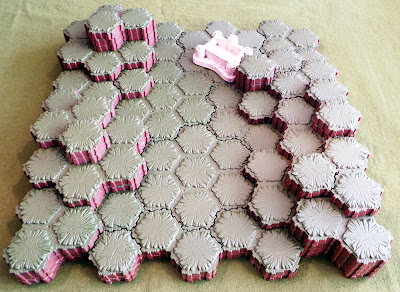As Sir Hector Boleyn-Green led the Shin Hills Field Force out into the flat land of the Shin Valley, the reason for the apparent precipitant withdrawal of the Shinwazis who had been defending the defile was clear ... it had been done to entice the Britannic troops into a trap!
Arrayed across the valley floor and centred on a stone-built tower atop of which could be seen the leader of the Shinwazis – Emir Abdul Ifran – praying for divine assistance and encouraging his troops to destroy the
farangi.
In response, Sir Hector formed the Shin Hills Field Force into a line, with his Artillery Battery and Machine Gun Detachment in the centre. On his right he placed the two Companies of the South Yorkshire Regiment and one Company of the Frontier Rifles, and on his left he had the two Companies of the Macfarlane Highlanders and other Company of the Frontier Rifles.
Sir Hector decided that he would wear down the Shinwazis with artillery fire before attempting any sort of advance, and ordered his Artillery Battery to concentrate on destroying the opposing Shinwazi Artillery.
The experienced Britannic gunners knew their stuff, and their first shells hit one of the Shinwazi Artillery batteries and caused casualties.
The return fire from the Shinwazi Artillery Batteries was ineffective, but it was the signal for the tribesmen the charge!
The Britannic response was devastating. The sound of rifles being fired in volleys, mixed with the rattle of the Gatling Gun, could be heard across the Shin Valley. The Shinwazis suffered terrible casualties before their charge had reached the Britannic line, and several bands had been forced to withdraw.
The opposing Artillery Batteries continued to exchange fire, and the Britannic gunner managed to score more hits on the already depleted Shinwazi Artillery Battery, knocking it out of the fight.
The Shinwazis were also more successful than they had been, and caused casualties amongst the Machine Gun Detachment.
Although some of the impetus of their charge had gone, several of the bands of Shinwazis reached the Britannic line and considerable fierce hand-to-hand fighting took place.
With both sides still refusing to give ground side, the casualties continued to mount.
Despite suffering casualties, the Machine Gun Detachment continued its deadly work, and one of the bands of Shinwazi tribesmen was obliterated.
At this point Sir Hector turned to the commander of the Artillery Battery and said '
It's time to end this slaughter! Can you hit that tower and put an end to that jackanapes who's atop it?'.
The young Captain replied '
With you here sir, I think that we can'
'
Then do it!' replied his superior officer.
The Britannic Artillery battery fired ... and hit the tower ... but the Emir was untouched. The remaining Shinwazi Artillery Battery fired back ... but the gunners were poorly trained and their rounds landed nowhere near their target.
Meanwhile the hand-to-hand fighting continued along the whole of the Britannic line.
Neither side would give ground, and the casualties began to mount.
Sir Hector again spoke to the young Artillery Captain. '
Things are getting desperate and I don't know how much longer the men will be able to hold the line. I'm relying on you to end this ... and to end it now!'
The young officer – whose name was Crook – gulped and stammered out an answer. '
Yes, sir! Right away!' He personally selected the next round from the nearby caisson, loaded the cannon, and aimed it himself.
'
Fire!'
The Bombardier in charge of the gun pulled the firing lanyard ... and after what seemed like an age (but which was a matter on milliseconds), the gun fired.
The shell flew towards it target ... and hit the very top of the tower!
All of a sudden the Emir's voice could no longer be heard echoing around the battlefield.
'
Well done, young man!' said Sir Hector to Captain Crook. '
I wouldn't be surprised if you have something important to tell your dear mama in your next letter home ... Major Crook!' The young officer looked away, embarrassed by the fact that he was intensely proud of what he had done.
All along the line the Shinwazis were falling back. The loss of their beloved Emir seemed to have taken all the fight out of them, and they now seemed more concerned with their own personal preservation than fighting the accursed and ungodly
farangi.
The Major in charge of the Macfarlane Highlanders sent a message to Sir Hector to ask if his men should advance after the retreating tribesman, but Sir Hector's reply was in the negative.
'
See to your wounded, Major. The men have been fighting hard these last few days and have won a close-run battle today. They need to have some rest and a hot meal. We'll camp here tonight, and tomorrow we will begin punishing the Shinwazis.'
And punish them they did. All the new rifles that the Shinwazis had bought were collected in and taken away. (The maker's markings had all been filed off, but the design was one used by the Rusland Army so there was little doubt of their place of origin.) A levy of five thousand Maria Theresa thalers (a currency that was widely used amongst the frontier tribes) was imposed on the Shinwazis, and a new, more friendly Emir was appointed to lead them in the future. He also agreed that a representative of the Britannic government would be welcome to stay in the Shin Valley for the foreseeable future.
As for Captain (acting Major) Crook ... well his promotion to the rank of Major was confirmed and he was awarded a Military Medal for his actions during the Shin Valley Campaign.






































































.png)










.jpeg)








